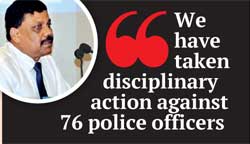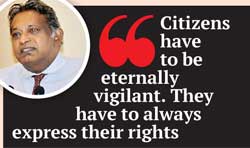Reply To:
Name - Reply Comment

 The ‘National Action Plan for the Protection and Promotion of Human Rights 2017 - 2021 (NHRAP) was launched last month at the Parliamentary complex. The five-year plan focuses on the key areas namely; civil, social, cultural, labour, environment, economic and political rights, prevention of torture and the rights of women, children, internally displaced persons, returning refugees, migrant workers and persons with disabilities.
The ‘National Action Plan for the Protection and Promotion of Human Rights 2017 - 2021 (NHRAP) was launched last month at the Parliamentary complex. The five-year plan focuses on the key areas namely; civil, social, cultural, labour, environment, economic and political rights, prevention of torture and the rights of women, children, internally displaced persons, returning refugees, migrant workers and persons with disabilities.
A Cabinet appointed Inter-Ministerial Committee spearheaded the National Action Plan. Government, civil society organizations, the National Human Rights Commission, United Nations agencies, INGOs and academics have been consulted in the formulation of the National Action Plan. While this Plan is commended for the inclusion of progressive activities in relation to promoting human rights it remains a question as to whether the Plan would be translated into reality.
At the 69th commemoration of the International Human Rights Day held at the Lakshman Kadirgamar Institute and organized by ‘Right to Life- Human Rights Center’, civil society groups and independent commissions expressed their views on the NHRAP and the status of human rights in the country at present.
-Prabath Lakshman Wijetunga
Director Public Complaint Investigation Department of the National Police Commission
 To the surprise of the audience Director Public Complaint Investigation Department of the National Police Commission Prabath Lakshman Wijetunga, said that it was the invitation from ‘Right to Life’ to attend the commemoration that presented an opportunity to inform the NPC of the National Action Plan. According to him some Government institutions were still not aware of the NHRAP.
To the surprise of the audience Director Public Complaint Investigation Department of the National Police Commission Prabath Lakshman Wijetunga, said that it was the invitation from ‘Right to Life’ to attend the commemoration that presented an opportunity to inform the NPC of the National Action Plan. According to him some Government institutions were still not aware of the NHRAP.
Meanwhile the NHRAP states that a special unit will be established within the NPC to record, investigate, take disciplinary action and refer for prosecution complaints on torture. Wijetunga said that work on this has already commenced.
Under Article 155, as amended by the 19th Amendment, the NPC can establish procedures to entertain and investigate public complaints made against a police officer or the police service and provide redress as provided by law. “If we find a police officer guilty we take disciplinary action against that individual,” he said.
When investigating into complaints on torture we have found that most victims had been involved in the illegal drug trade. Sometimes the complainant does not cooperate
Since the establishment of the NPC on 14 October, 2015 it has received 467 complaints in 2015, 1879 in 2016 and around 1400 so far in 2017. “We have taken disciplinary action against 76 police officers. Preliminary investigations have been initiated against 25 police officers,” said Wijetunga.
He assured that as soon as they received a complaint on torture they had acted promptly. “We go to the police station where it is alleged that the torture took place and inspect the place. We inquire into how the person was arrested,” he said.
Under the Torture Act, torture can be either physical or psychological, he said. “A person who has been subjected to torture will be removed immediately and hospitalized. We have the power to extract statements and investigate into such allegations.
“When investigating into complaints on torture we have found that most victims had been involved in the illegal drug trade. Sometimes the complainant does not cooperate.
This is because they want to continue with the trade and they believe that an investigation would impede their opportunity of reassuming the trade. Then we are helpless because we can’t proceed with investigations,” he said.
-Dr. Deepika Udagama
Chairperson of the Human Rights Commission(HRC)
 Chairperson of the Human Rights Commission(HRC), Dr. Deepika Udagama stressed that many activities in the National Action Plan were progressive. However, she admitted that the chapter on economic, social and cultural rights was weak. “But plans about women’s rights, torture, civil and political rights are very strong,” she said.
Chairperson of the Human Rights Commission(HRC), Dr. Deepika Udagama stressed that many activities in the National Action Plan were progressive. However, she admitted that the chapter on economic, social and cultural rights was weak. “But plans about women’s rights, torture, civil and political rights are very strong,” she said.
“Most of these areas in the NHRAP will fall under the eight thematic sub committees under the HRC. For instance, there are committees for women’s rights, ESC rights, torture etc. Every committee comprises Human Rights Commissioners and civil societies,” she explained.
“We don’t know what happened to the previous National Action Plan. We hope that the 2017-2021 Action Plan will not share the same fate as that of its predecessor. It is the responsibility of the citizens to ensure this,” she said.
Dr.Udagama said that there was a great improvement in the state of human rights in the country. However, she highlighted the inexplicable delays in certain matters such as ending impunity.
She further observed that the silence of the wise and just was detrimental to a democracy.
“You can’t just vote and stay aside. No democracy has been strengthened in this manner,” she observed.
-Dr. Paikiasothy Saravanamuttu
Executive Director of the Centre for Policy Alternatives (CPA)
 Executive Director of the Centre for Policy Alternatives (CPA), Dr. Paikiasothy Saravanamuttu said that the NHRAP was a reflection of the change that has taken place in the area of human rights in the country since 2015. But he queried as to whether the change has been used to strengthen human rights.
Executive Director of the Centre for Policy Alternatives (CPA), Dr. Paikiasothy Saravanamuttu said that the NHRAP was a reflection of the change that has taken place in the area of human rights in the country since 2015. But he queried as to whether the change has been used to strengthen human rights.
“Have we done our (civil society) bit? Or are we assuming that it is adequate to make plans and pass laws and all we have to do is watch and criticize?” he further quizzed.
“From 2012 onwards we’ve had successive resolutions on this country. These resolutions began almost as appeals to the Government. The very first resolution on Sri Lankan asked to implement the LLRC recommendations. We all contributed towards making that change. Now citizens can’t take a break. They can’t go on holiday. Citizens have to be eternally vigilant. They have to always express their rights, fight for their rights and protect their rights,” he said.
“My appeal is that we have to make this Human Rights Action Plan more accessible to people at large. People need to know what is inside this,” he said.
He said that the Right to Information legislation should be used to ensure that the Government departments, the various ministries and commissions were performing their duties as expected. At a recently held UNESCO conference on Regional Cooperation to Promote Freedom of Expression and the Rule of Law in Asia through Ending Impunity for Crimes against Journalists, the issue on the numerous attacks against the Uthayan newspaper was raised. “The Minister of Law and Order in response said that he didn’t know about them and asked for a list, and it was given to him. These are the ridiculous things that are happening,” pointed out Dr. Saravanamuttu.
He further explained that transitional justice and constitutional reform go hand in hand. He pointed out that though four mechanism were promised in relation to transitional justice only one mechanism is to be operationalised. “We are just about to get one (Office on Missing Persons). The others probably not. I think constitutional reform is stuck at the moment,” he said.
“I was secretary to a Task Force on public consultation with regard to reconciliation. We were appointed by the Government. We were asked to find out from the citizens of the country what they thought about the four mechanisms the Government promised in Geneva. How can we go and ask people about the four mechanisms when they don’t know anything about them?,” he asked
He said that at a private meeting with the President they were told that if transitional justice became the focus, constitutional reform will not take place due to the fear that war heroes will be penalized.
“There are lots of changes that can be made which don’t require a two thirds majority in Parliament or a referendum,” he pointed out.
He stressed that human rights should be upheld for democracy to be preserved. “We need to establish a culture of human rights,” he said.
(Pix by Nisal Baduge (11.12.2017)